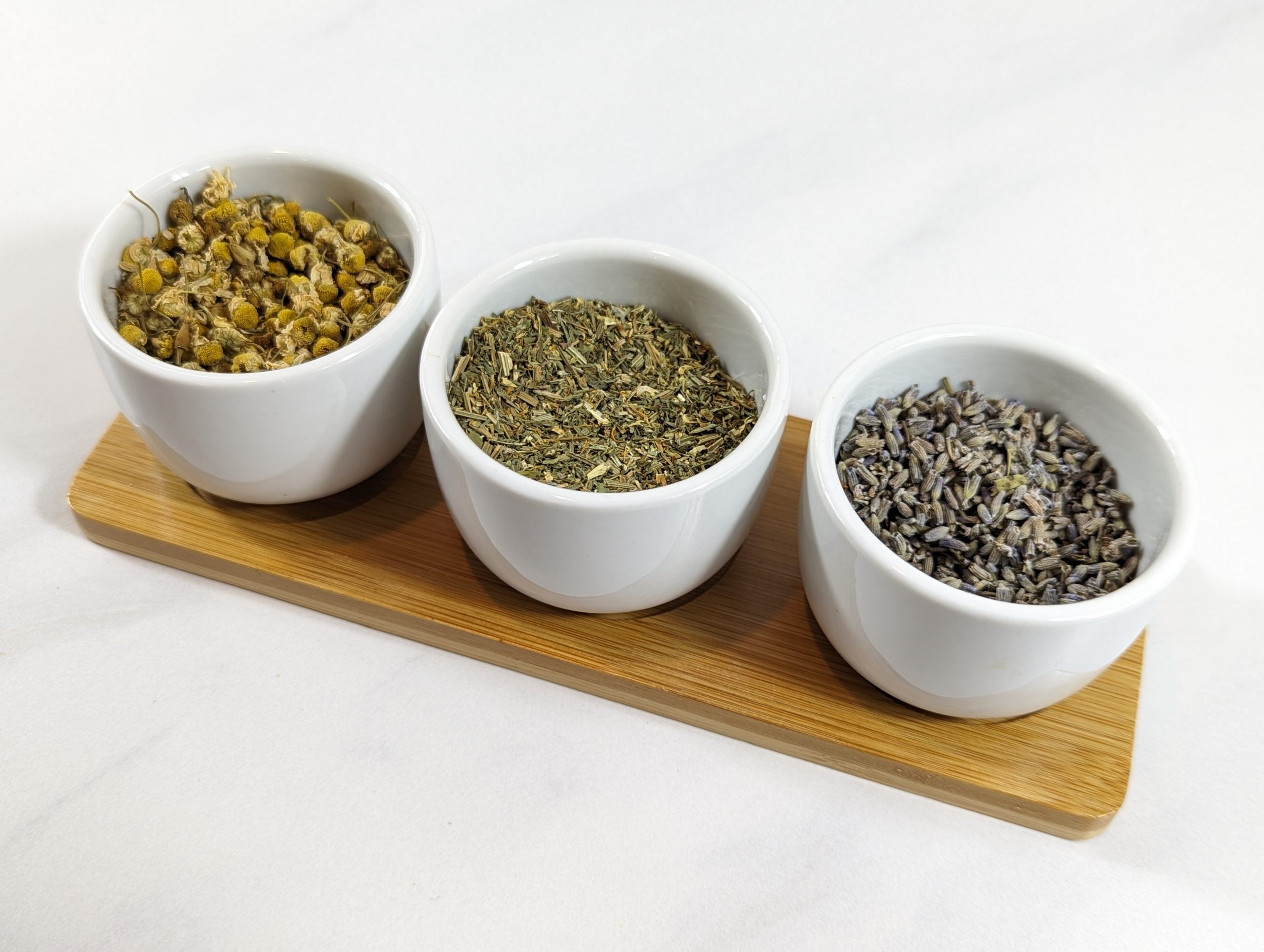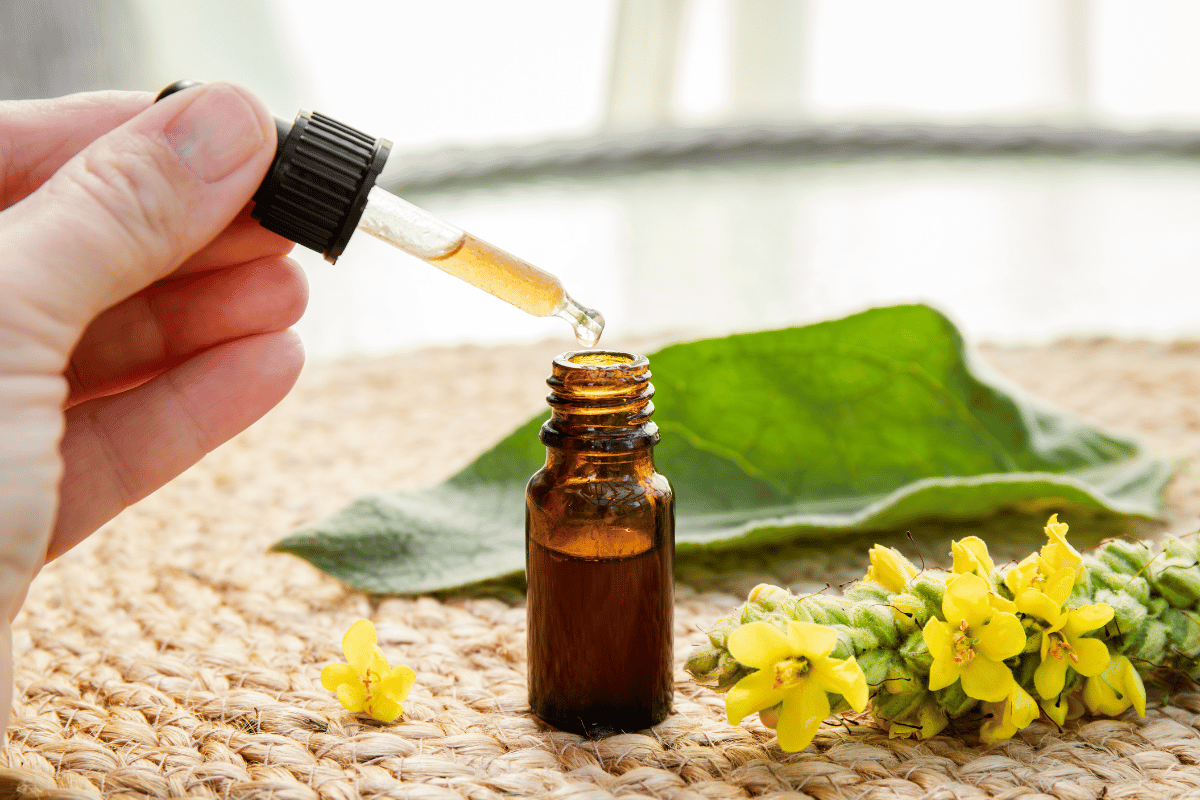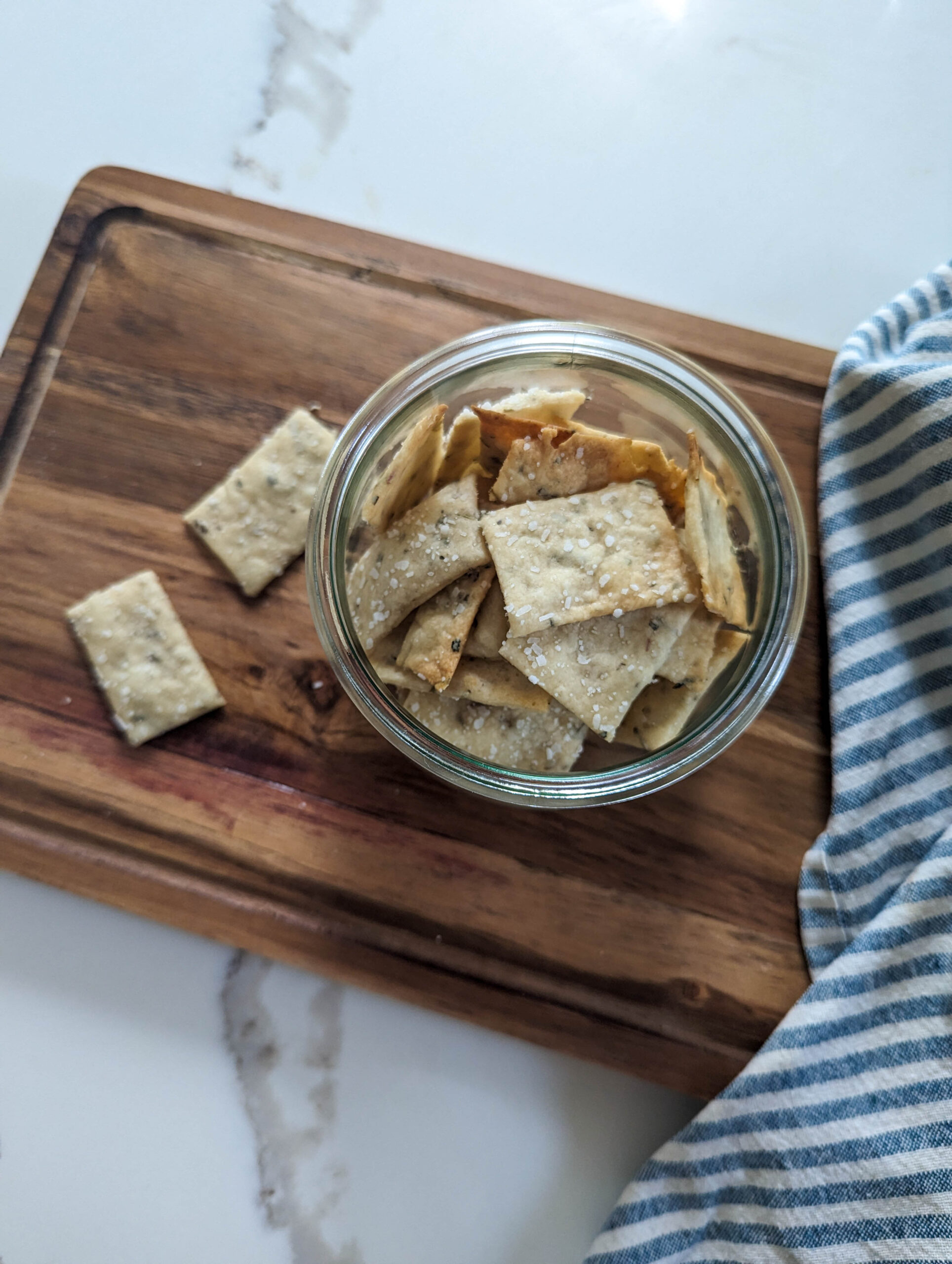Best Herbs for Bronchitis: Natural Remedies for Treatment
This post will discuss the best herbs for bronchitis. Before learning about the best herbs for bronchitis, you should understand the respiratory system itself. Herbs work best when you understand what system they are working on and how they are working. I will then define what bronchitis is, the types, symptoms, causes, who is most at risk for developing, and how to treat and heal bronchitis. Treatments that will be discussed are the current medical model, home remedies, herbal medicine, and the use of essential oils with herbs.
While I am a registered nurse (RN, BSN), I am not a medical doctor. Please take this education and speak with your healthcare provider before taking these herbs.

Respiratory system: upper respiratory infections vs lower respiratory infection
These infections affect your sinuses and throat.
An upper respiratory infection includes:
- Common cold.
- Epiglottitis.
- Laryngitis.
- Pharyngitis (sore throat).
- Sinusitis (sinus infection).
A lower respiratory infection affects the airways and lungs. Usually, these are longer lasting and can become more serious.
The lower respiratory infection area is:
- Bronchitis
- Bronchiolitis: is a lung infection that mostly affects young children.
- Chest infection.
- Pneumonia.
In this post, I am focusing on the best herbs for bronchitis. While some of these herbs may also work for other respiratory infections, they may not be what I consider the best for.
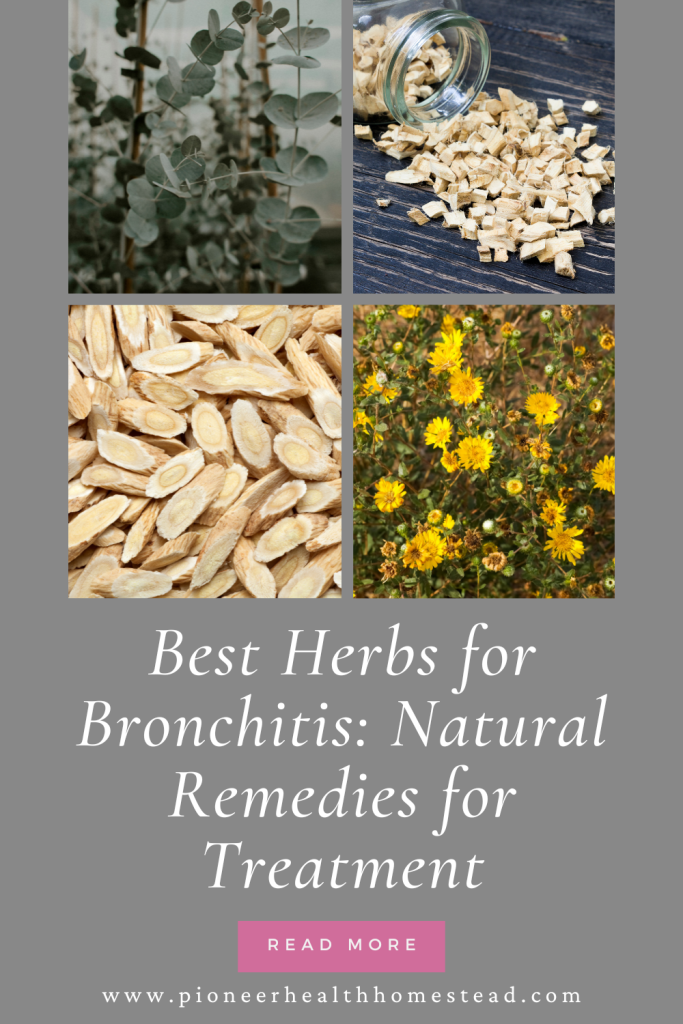
What is Bronchitis?
Bronchitis is considered a lower respiratory infection and is the inflammation (-itis) of your bronchial tubes (bronch-). Your bronchial tubes carry oxygen to and from your lungs. They are the tubes that branch out below the trachea that serve your lungs. When the bronchi become inflamed, their lining swells, and the breathing passages narrow becoming a potential airway obstruction. The inflamed lining will also produce mucus, which can narrow the airway even more and can sometimes cause difficulty breathing.
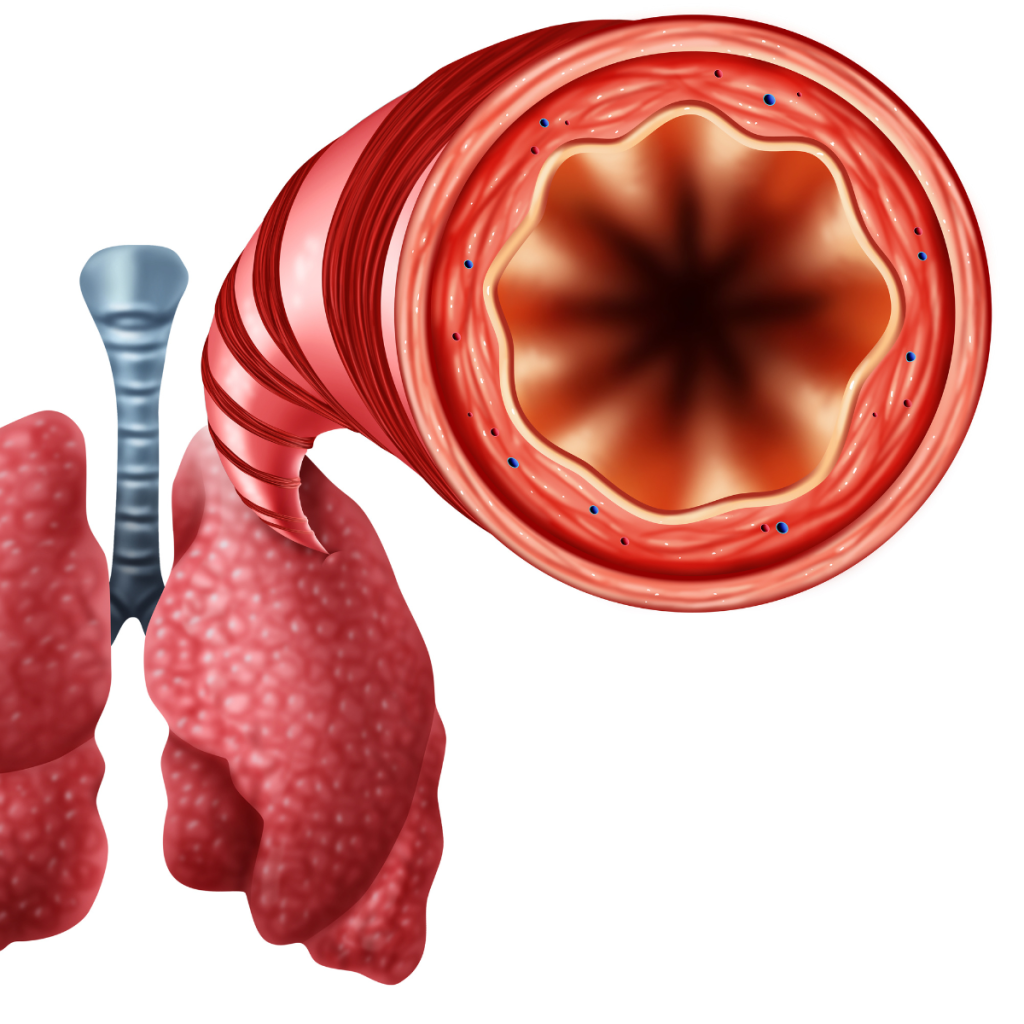
Types of bronchitis
There is both an acute and chronic diagnosis of bronchitis.
The most common form of bronchitis is acute, generally caused by viral infections such as a cold or other respiratory infection but it can also be from a bacterial infection. Acute bronchitis generally lasts 7-10 days, but the persistent cough can linger for several weeks. More than 5% of the population experience this at least once a year following the common cold. Bronchitis used to be known as a “chest cold” and is at least 90% of the time caused by viruses.
Chronic bronchitis, which is a more serious condition, is a constant irritation or inflammation of the lining of the bronchial tubes. Chronic bronchitis is defined as a productive cough (sputum) that lasts at least three months, with recurring bouts occurring for at least two consecutive years. It is most often due to smoking and is one of the conditions included in chronic obstructive pulmonary disease (COPD). This can ultimately lead to decreased oxygen levels and is considered a serious medical condition.
Symptoms of bronchitis
For either acute bronchitis or chronic bronchitis, signs and symptoms may include:
- Cough
- Sore throat
- Production of mucus (sputum), which can be clear, white, yellowish-gray, or green. If severe, can be blood-tinged sputum.
- Fatigue, exhaustion
- Shortness of breath (SOB)
- Slight fever (febrile) and chills
- Chest discomfort, chest congestion

What causes bronchitis?
Several viral respiratory infections are causes of bronchitis such as:
- the common cold
- influenza
- respiratory syncytial virus (RSV)
Who is at risk for bronchitis?
The basic risk factors for developing bronchitis are:
- Cigarette smoking or exposure to secondhand smoke (cigarette smoke from someone else)
- Older age.
- Exposure to fumes or certain kinds of dust.
- A family history of COPD.
- A history of respiratory diseases such as asthma, cystic fibrosis, or bronchiectasis.
How is Bronchitis generally treated?
Treatment for bronchitis generally includes:
- Bedrest
- Hydration
- A soft diet
- Humidifiers
- Salt water gargles
- Throat lozenges
- Pain and fever medication.
If it is caused by a chronic condition, such as COPD, the use of bronchodilators may be recommended by a physician.
Because a viral infection causes most bronchitis, antibiotics are not often used. Antibiotic treatments are generally reserved for a suspected bacterial infection.

Natural treatments
Using herbal medicines such as teas, syrups, and tinctures is a great way to treat bronchitis naturally at home.
It is important to understand how the herbs you’re using affect your symptoms and the ailment itself. The best herbs for bronchitis may not be the best herbs for another respiratory disease because they work differently.
The best herbs for bronchitis
I use many of these herbs for my family and friends. I also use some of these in my online shop for my cough and sore throat syrup and the lung and chest congestion syrup.
These are the best herbs for treating bronchitis and its symptoms. There are two recipes below for a dry or moistened cough with these used as main-acting herbs.
The best herbs for bronchitis are:
- Elecampane
- Eucalyptus
- Grindelia (Gumweed)
- Licorice
- Marshmallow
- Pine
- Spikenard
Check out my resource page for best places to buy herbs and equipment.
Elecampane
Elecampane (Inula helenium) is known as an expectorant and is an amazing herb for clearing phlegm and mucus from the lungs. It is also great at soothing coughs. It’s been long valued for its tonic-strengthening effect on the respiratory system and for its ability to resolve chest infections. It is a great herbal option for chronic respiratory infections and cough syrups.
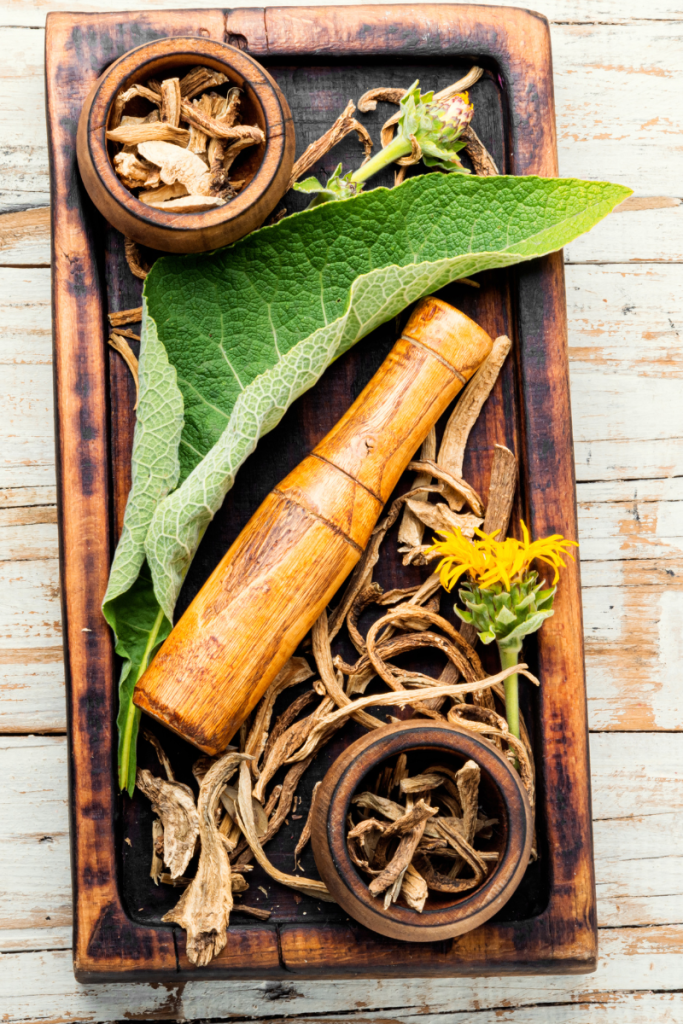
Warning that this herb can cause skin reactions. Some resources have said not to take it during pregnancy or while breastfeeding, however, there is no specification as to why that I have found.
This herb is used in decoctions, tinctures, and syrups.
- Decoction for irritable coughs take 1/3 cup 2-3 times a day.
- Tinctures for bronchitis mix 2 1/2 tbsp with 2 1/2 tbsp thyme tincture. Take 1 tsp 3 times a day.
- Syrups for coughs, take 1-2 tsp every 2 hours.
Eucalyptus
Eucalyptus (Eucalyptus globulus) is an antibacterial, antimicrobial, and expectorant. It is warming and stimulating and a strong expectorant suitable for chest infections, including bronchitis and pneumonia. The leaves of eucalyptus are helpful for damp coughs, lingering bronchitis, damp asthma, and in some cases COPD. This can be used as a fresh or dried herb or as an essential oil (see below).
Some have used the fresh leaves of eucalyptus in their showers. This can be helpful alongside the steam (humidification) for clearing out and opening up the lungs.

A warning for eucalyptus is to only use small amounts internally with children, adults can consume larger amounts.
Eucalyptus can be taken in capsules, lozenges, infusions, tinctures, and inhalation.
- Capsules for bronchitis take 200 mg 3 times a day.
- Infusion for bronchitis take 1 cup 3 times a day.
- Tincture for chest coughs add 1/2 tsp tincture to 1/2 cup water and take twice a day.
Grindelia (Gumweed)
Grindelia (Grindelia spp.) is an expectorant and decongestant that is very good at breaking up hardened mucus in the respiratory system. It has been known to ease breathing in bronchitis and asthma. It has antispasmodic actions that open up the smaller passages in the lungs to make breathing easier.
If needed, this herb can be combined with plantain to pull thick mucus out of the lungs.
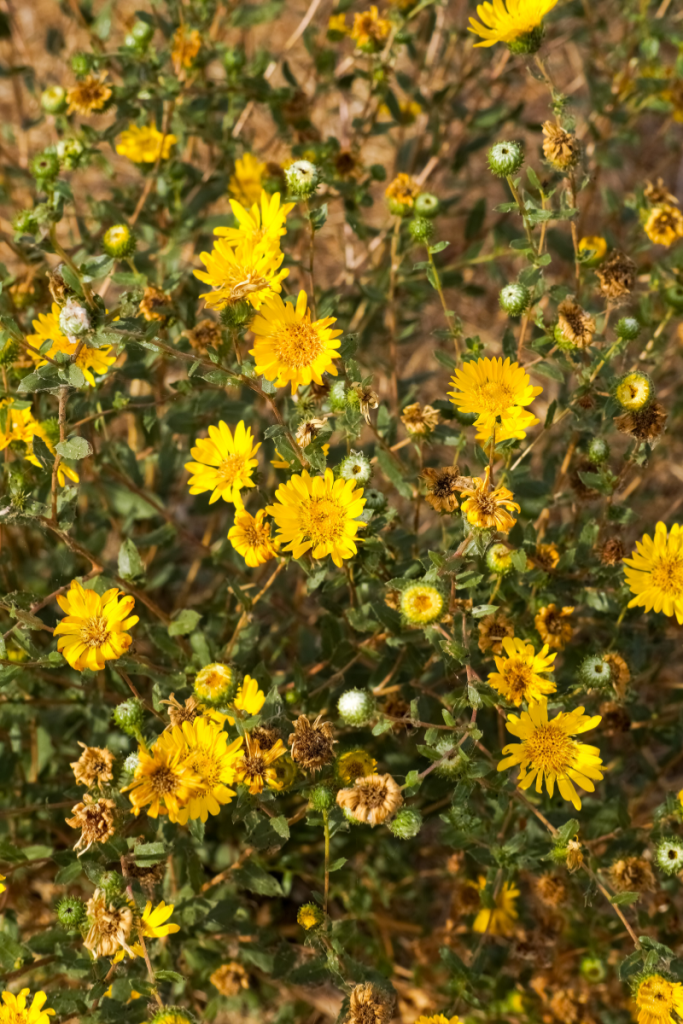
This herb can be toxic in large doses and is not for long-term use with those diagnosed with kidney or heart disease.
It is taken as a tincture 1-3ml 2-4 times daily. Can take 5 drops every 15-30 minutes during coughing fits.
Licorice
Licorice (Glycyrrhiza glabra) root is well known for its sweet constituents making it a popular candy. It can work through complex combinations of constituents including mucilaginous material that makes it soothing for inflamed and irritated tissue. It has a long history of being used to relieve throat and respiratory inflammation.
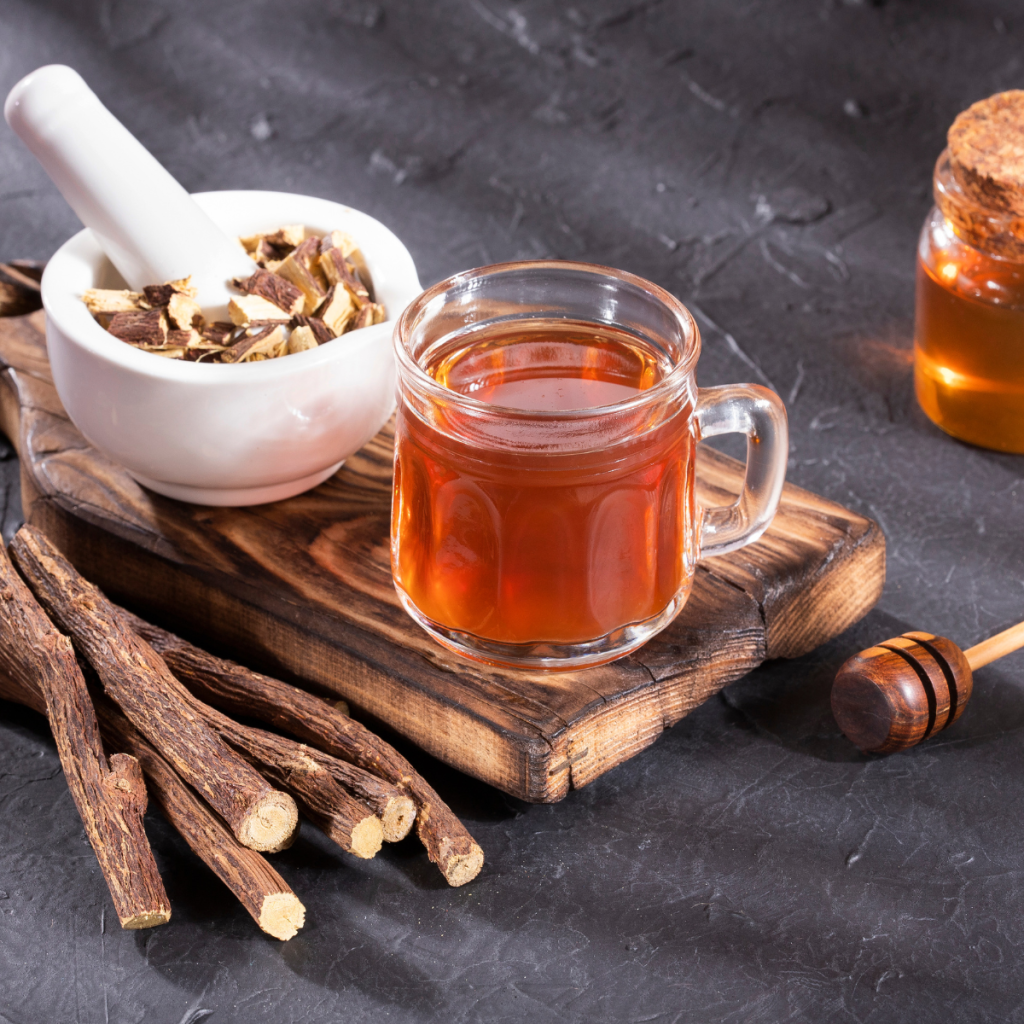
This herb should be avoided in people who have high blood pressure (hypertension) or when on the medication digitalis. It should not be consumed for long periods. Use in pregnancy only under the supervision of a qualified professional or in small quantities in a formula.
The licorice root can be taken as a tincture and decoction, capsule, or in a formula as a syrup.
- Weak decoction 4-6 oz 3 times a day.
- Tincture 1-5 ml 1-4 times a day.
- Capsule 500-1000 mg up to 4 times a day.
Marshmallow root
Marshmallow (Althaea officinalis) is a mucilaginous herb that helps to soothe inflamed and irritated tissues in the lungs while also reducing swelling. It can ease respiratory congestion and dry coughs.
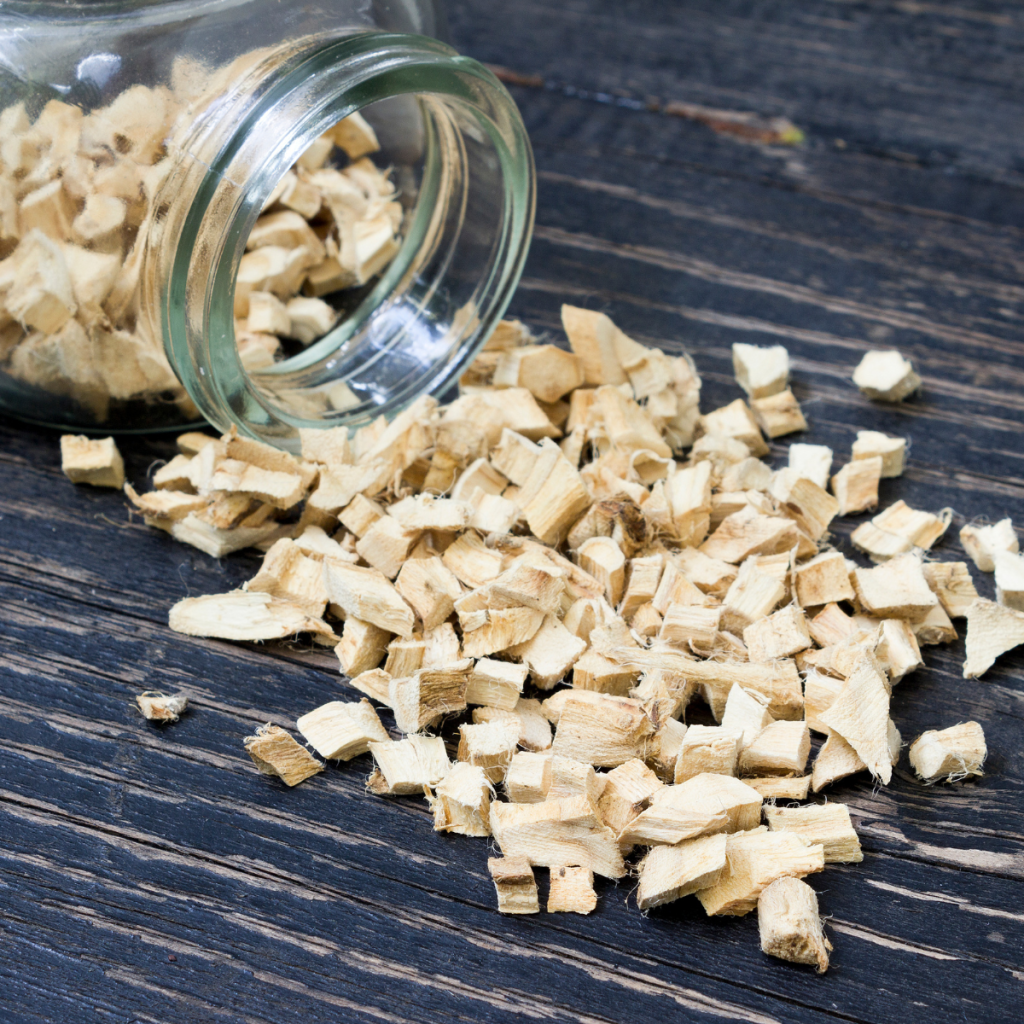
There are no known warnings as it is a safe and mild herb for infants, children, and elderly adults.
Taken in syrup formula, cold infusion, tincture, or capsule.
- Cold infusion take 2-8 oz 1-4 times a day
- Tincture take 10-60 drops 1-4 times a day.
- Capsules 1000-5000 mg up to 3 times a day.
Pine (white)
White pine (Pinus strobus and other species) is very helpful in cases of chronic bronchitis and for getting old, thick, green mucus up and out of the lungs and sinuses. This is primarily used as an expectorant and helps fight respiratory infections.
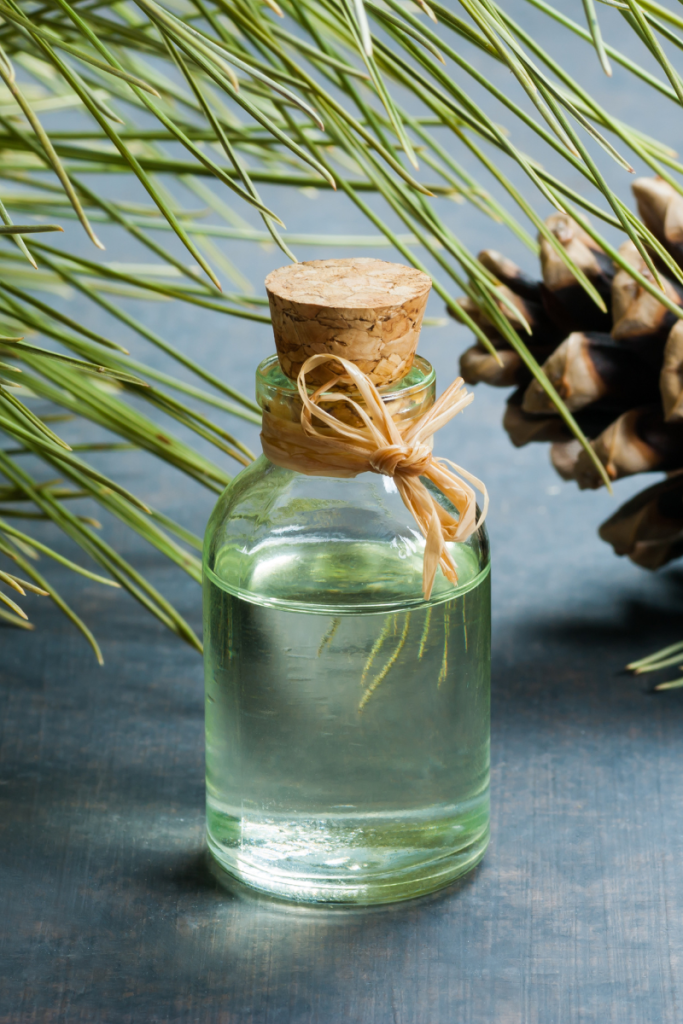
There are no known warnings for this herb.
Taken as a standard infusion, tincture or glycerite.
- Standard infusion from fresh or dried needles is 4-8 oz 1-4 times daily.
- Tincture from the gum is 10 drops to 1 ml up to 4 times a day.
- Glycerite from the gum or bark is 10-20 ml 3-4 times a day.
Spikenard
Spikenard (Aralia racemosa) is an excellent lung tonic because of its expectorant properties. It is helpful for colds, chronic coughs, bronchitis, and asthma. It can even be used for chronic weak lungs with a cough or after quitting smoking.
This should not be taken during pregnancy.
Taken as a standard infusion or tincture.
- Standard infusion 1-2 tsp powdered root per cup; 1/2-1 cup daily in small doses throughout the day.
- Tincture 20-40 drops daily as a tonic or for acute respiratory problems 60-80 drops 2-3 times a day or as part of a formula.
Before taking any of these herbs, speak with your healthcare professional about your current condition and your medical history if you have any concerns.
Essential oils for respiratory diseases
Using essential oils in conjunction with the best herbs for bronchitis, will give you ultimate relief. The essential oils listed below will work without the above herbs if you do not have them available. I would recommend utilizing both the herbs and essential oils if possible.
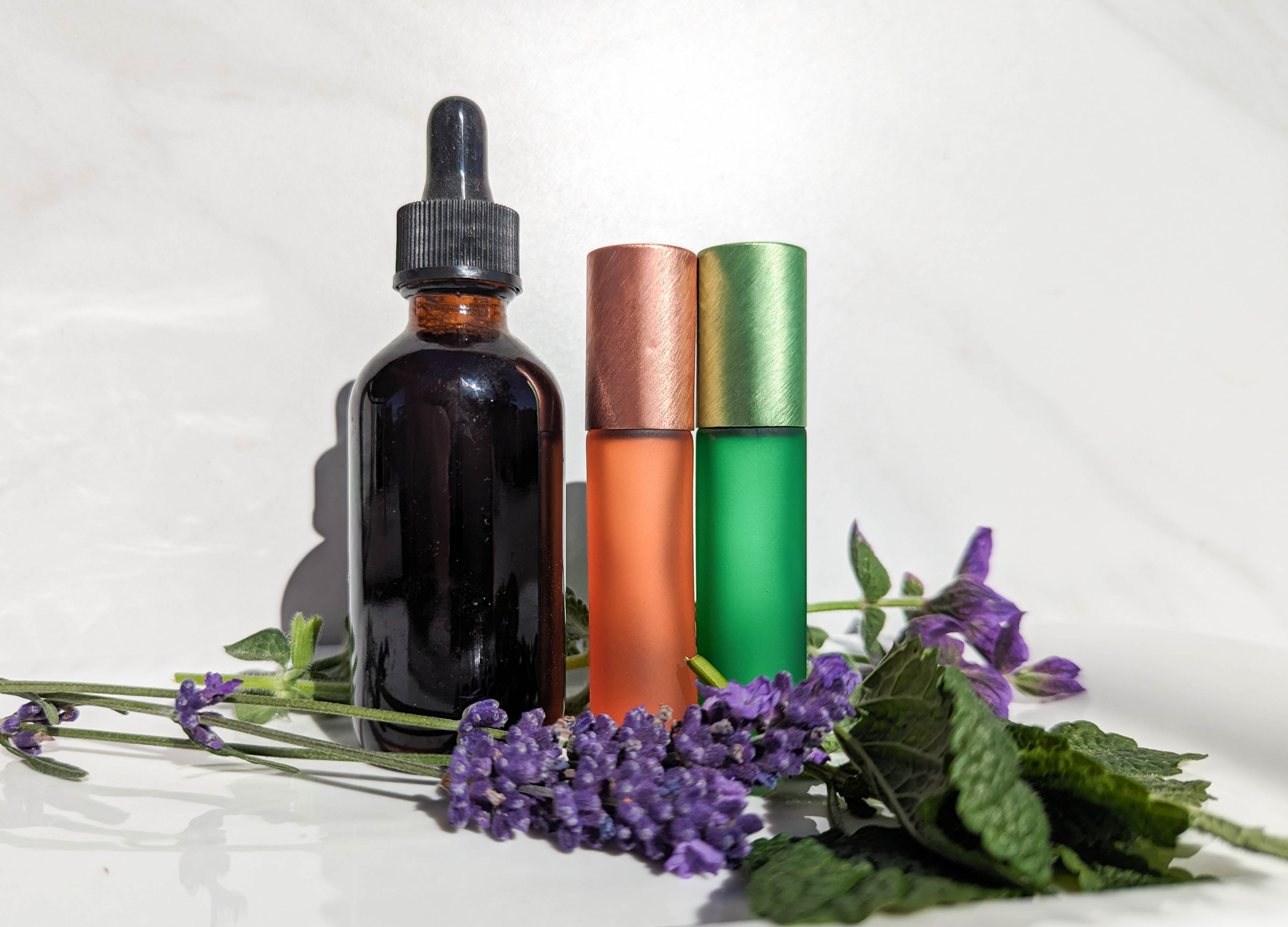
Eucalyptus
Eucalyptus (Eucalyptus globulus) oil is often used for respiratory diseases. It is used as an expectorant, mucolytic, antiviral, and antibacterial properties.
This oil should not be used without supervision for children under the age of 4 because of possible neurotoxicity. Do not consume eucalyptus as an essential oil unless supervised by a trained professional.
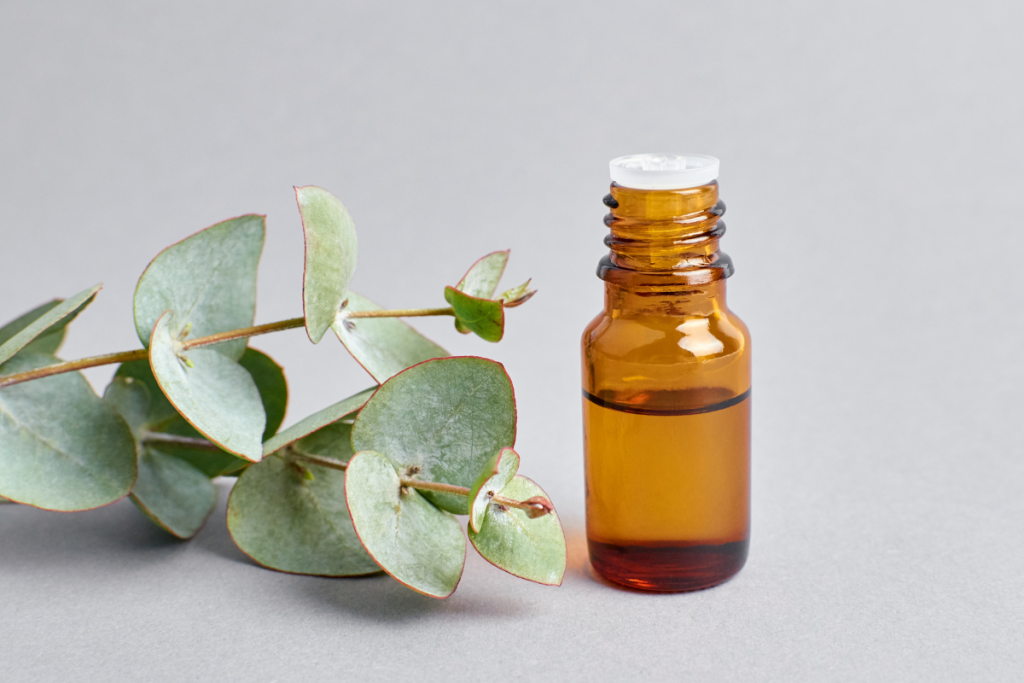
The eucalyptus oil can be applied topically neat, diluted, or in a formula such as in salves. It can be used in a diffuser or drops on the palms of hands and inhaled.
- Inhalation for colds add 10 drops of essential oil to boiled water and create a steam tent.
- Use 5 drops diluted with 2 tsp carrier oil as a chest or sinus rub.
- Can be applied neat if not sensitive.
- Diffuse or inhale directly if desired.
Oregano
Oregano oil is a powerful antiviral, antibacterial, antifungal, anti-inflammatory, and immune stimulant. The French method of use is for chronic bronchitis.
It should only be used for approximately 7 days before taking a break from it so it does not harm your liver. Not for use in children under 6 years old. Can cause extreme skin irritation.
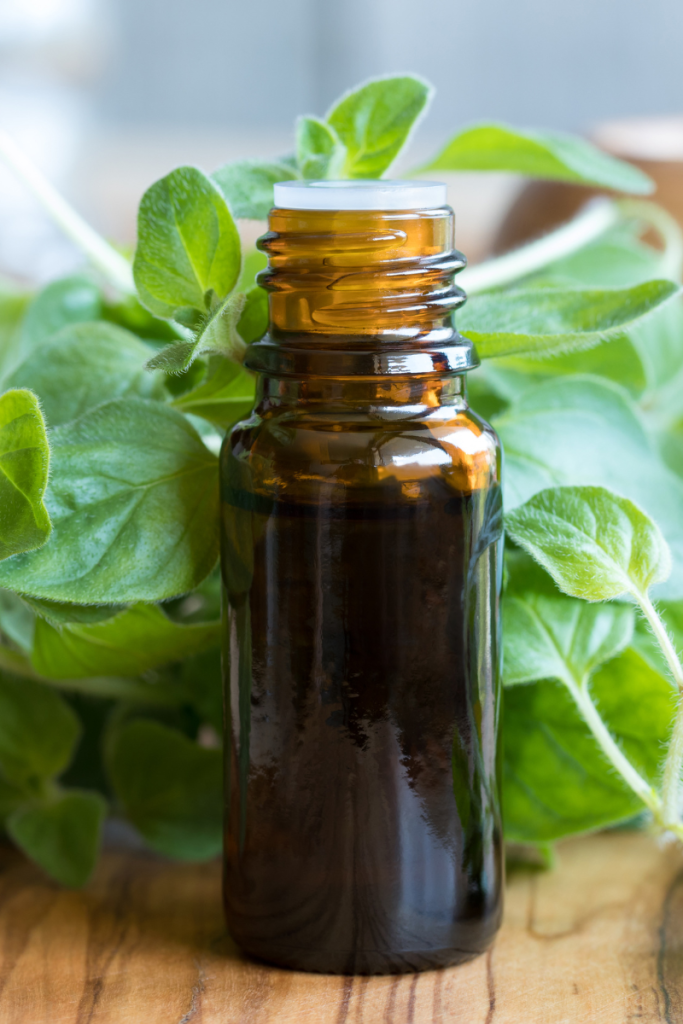
To use oregano oil, dilute 1:3 (1 drop EO to 3 drops carrier oil) when using topically. Taken orally, make sure it is a certified essential oil for internal use by the FDA. Dilute 1 drop in 1 tsp of honey or 4 oz of water/beverage of choice.
Peppermint
Peppermint (Mentha piperita) is one of the oldest and most highly regarded herbs/essential oils. It is anti-inflammatory, antibacterial, and antiviral. It is used often in respiratory infections for its ability to help open the airways.
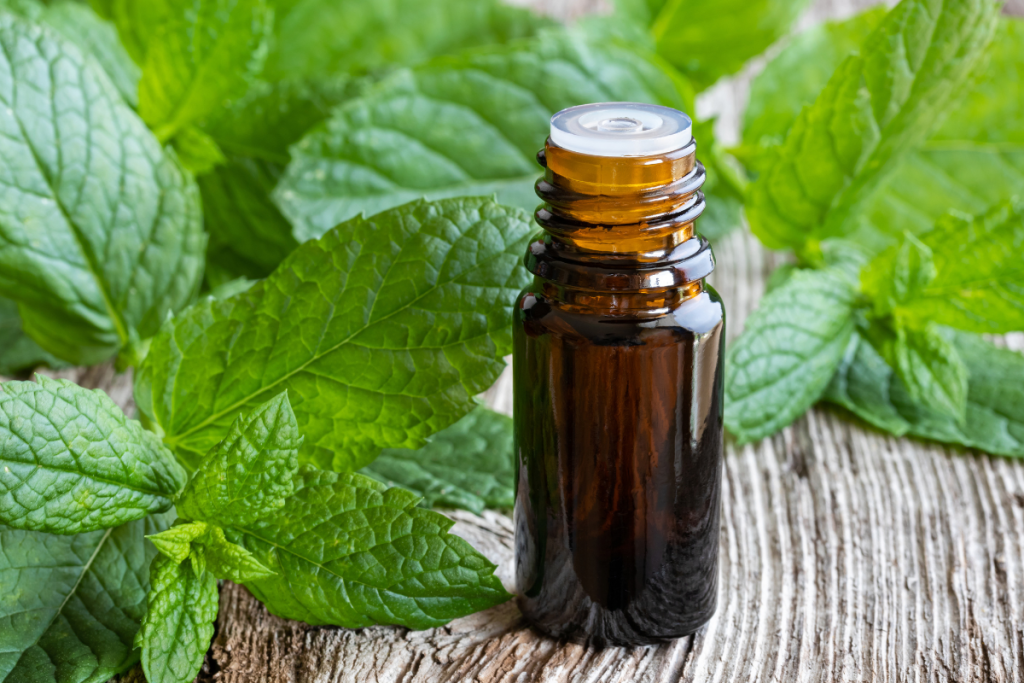
Avoid contact with eyes, mucus membranes, sensitive skin, or fresh wounds or burns. Do NOT apply on infants younger than 18 months of age.
Dilute 1 part essential oil to 2 parts carrier oil and apply 1-2 drops to the sinuses or chest. Can be inhaled directly, diffused, or taken internally if FDA-approved.
Pine
Pine (Pinus sylvestris) was first investigated in Western medicine in 1990 and found to have benefits to the respiratory system and antiseptic properties. It shares many of the same properties as eucalyptus and the action of both of the oils is enhanced when mixed. It is used to treat lung infections. Its main uses are for the throat, lungs, and sinuses.
Be aware of pine oils that me adultered with turpentine. Make sure to only use pure essential oils.
Dilute 1 part essential oil with 1 part carrier oil. Apply 2-4 drops to the sinuses or chest. Can also inhale directly or diffuse.
Supplements
The supplements that I believe to be most beneficial for bronchitis will be the ones that support the immune system.
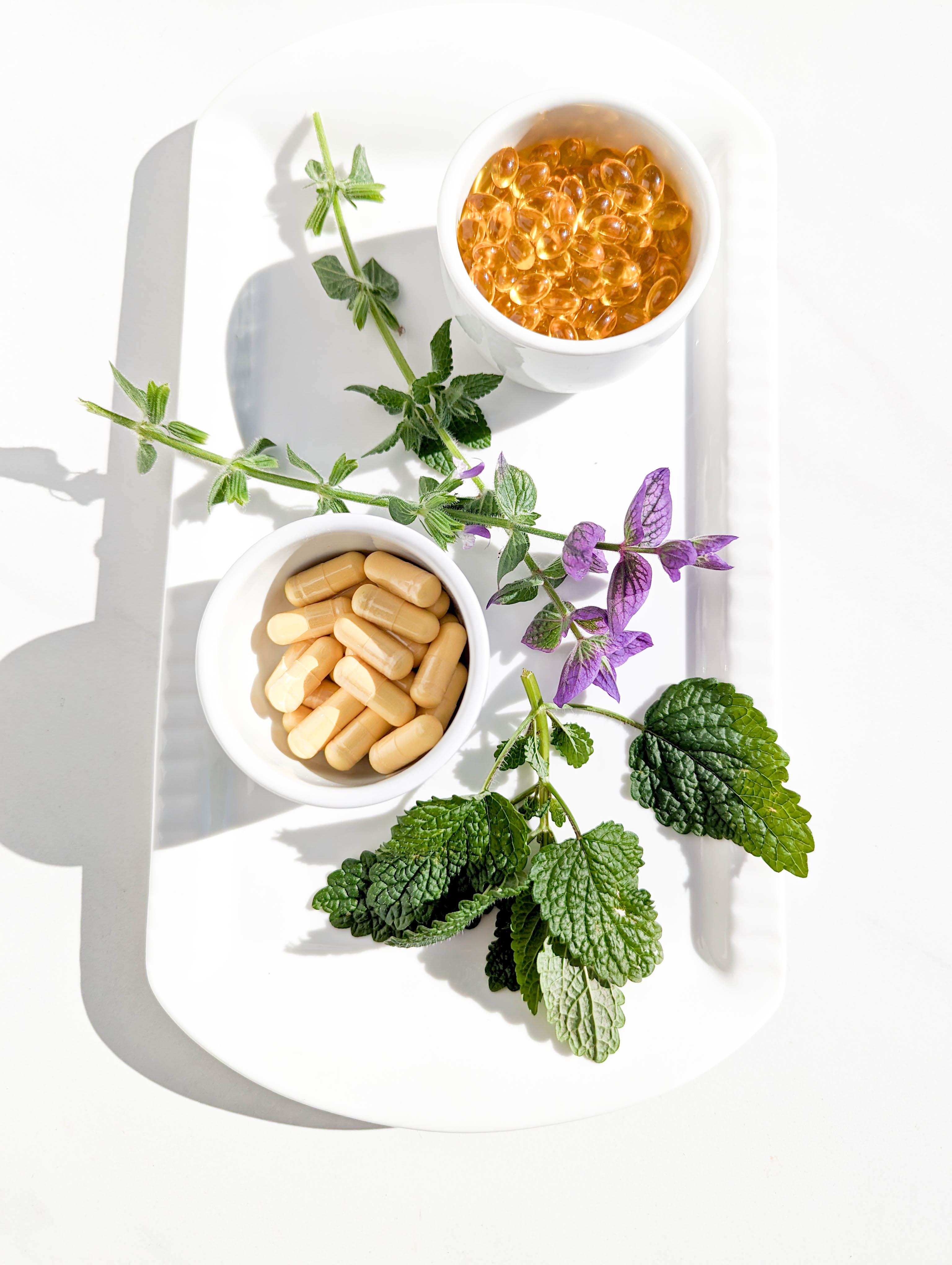
These supplements include:
- Vitamin C
- Vitamin D
- Zinc
- Magnesium
I have a previous blog post in more depth on these supplements and more: Cold and Flu Viruses | How to Treat at Home | Natural Remedies.
The best herbs for strengthening your lungs over time
Astralagus (Astragalus membranaceus) is an adaptogenic and tonic herb that can boost energy and your immune system. It can help prevent and treat upper and lower respiratory infections while also having benefits in treating allergic asthma. There are no known warnings for this herb.
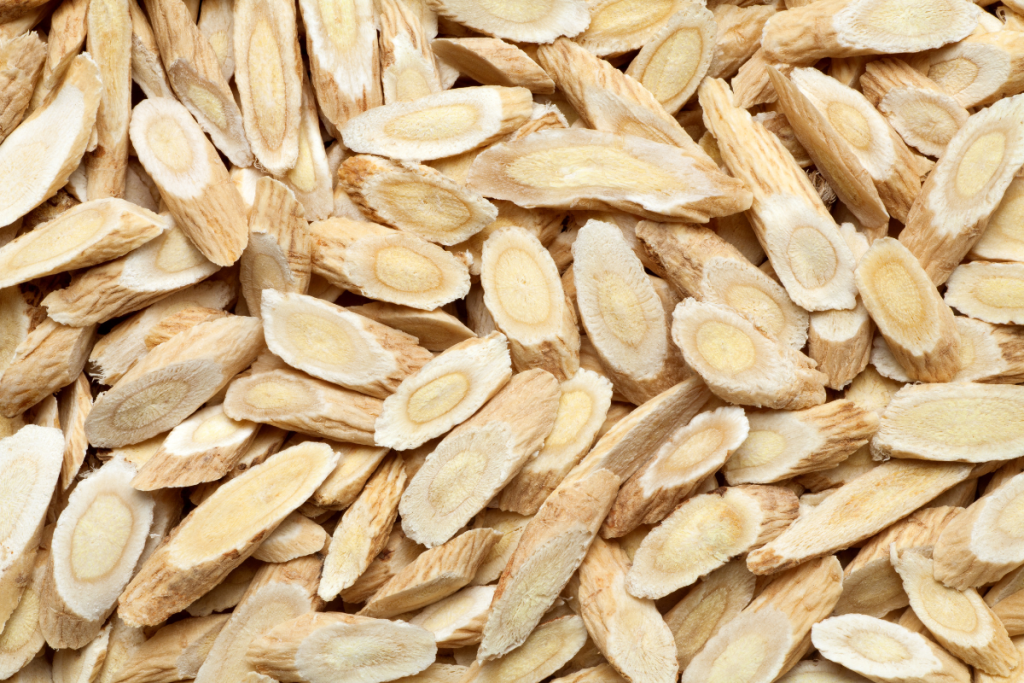
Herbal remedy with the best herbs for bronchitis
These two cough syrups are an effective treatment for bronchitis. One is for a dry and unproductive cough. This can help to moisten the lungs and expel any trapped mucus. The moistening herbal cough syrup helps to expel mucus and is also a decongestant for those experiencing a damp cough with a lot of mucus production and sinus drainage.
Drying Herbal Cough Syrup
This herbal cough syrup helps to expel mucus and is also a decongestant for those experiencing a damp cough with a lot of mucus production and sinus drainage.
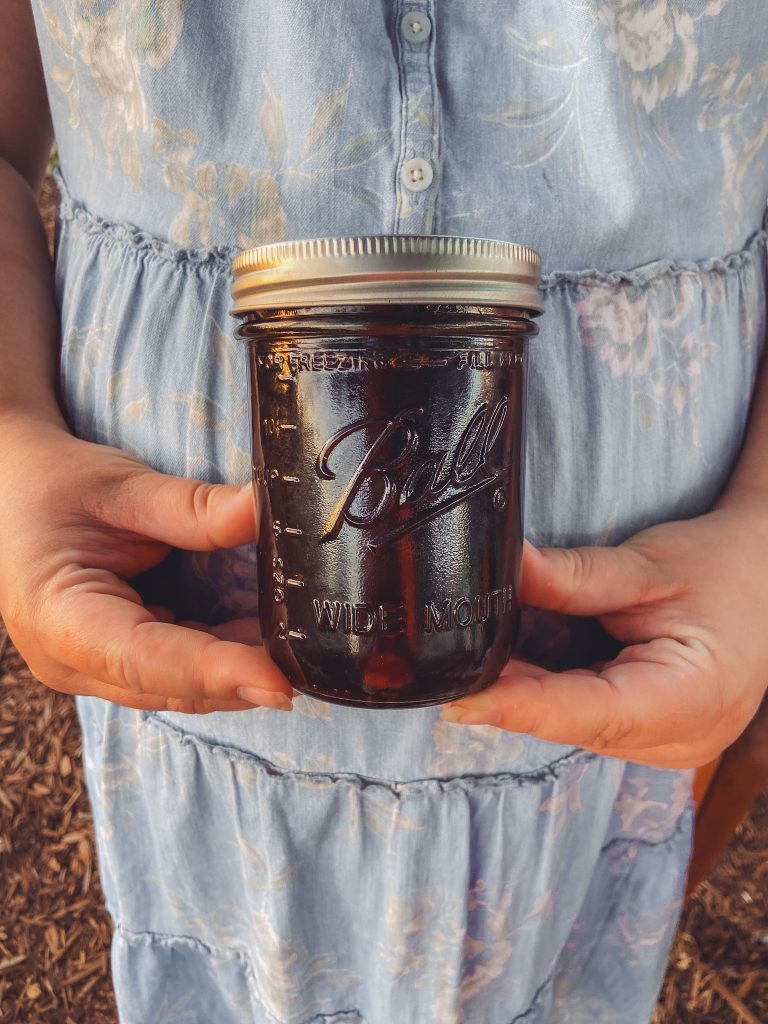
EQUIPMENT
- 1 stock pot
- 1 mesh strainer
INGREDIENTS
- 2 parts wild cherry bark
- 2 parts white pine bark
- 1 part spikenard
- 1 part elecampane
- 1 part yerba santa
- 1 part licorice root
- 1/2 part thyme
- 1/2 part cinnamon
- raw honey or other sweetner to taste
INSTRUCTIONS
- Add water and desired amount of herbs to saucepan.
- Bring to a simmer over low heat for approximately 2 hours*. The contents should decrease by about half when completed.
- Strain herbs and compost used herbs.
- Add desired amount of honey or another sweetener once contents has cooled to approximately 100 degrees.
- Bottle and keep in fridge.
NOTES
To determine the amount of each to add to your recipes each part will be considered a unit of measure. For example, if you make 1-part equal 1/4 cup, then 2 parts in this recipe will equal 1/2 cup and so forth. Or use ounces for better measurement. A part can then be 1/2 oz and for a 2-part herb requirement you would use 1 oz of that herb for this recipe.
You generally use 3oz of herbs per quart of water.
Adding the honey in once the syrup has come to around 100 degrees is to not kill the beneficial properties of raw honey. You can disregard this if not using raw honey and add your sweetener whenever you’d like.
Make sure to research the above herbs before using. Talk with your healthcare provider for any questions or concerns in regard to your personal medical history.
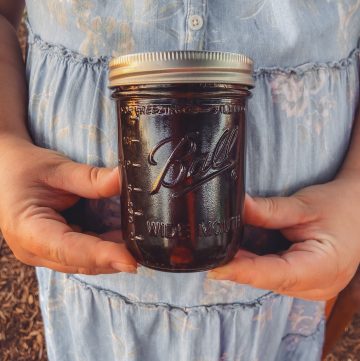
Drying Herbal Cough Syrup
Equipment
- 1 stock pot
- 1 mesh strainer
Ingredients
- 2 parts wild cherry bark
- 2 parts white pine bark
- 1 part spikenard
- 1 part elecampane
- 1 part yerba santa
- 1 part licorice root
- 1/2 part thyme
- 1/2 part cinnamon
- raw honey or other sweetner to taste
Instructions
- Add water and desired amount of herbs to saucepan.
- Bring to a simmer over low heat for approximately 2 hours*. The contents should decrease by about half when completed.
- Strain herbs and compost used herbs.
- Add desired amount of honey or another sweetener once contents has cooled to approximately 100 degrees.
- Bottle and keep in fridge.
Notes
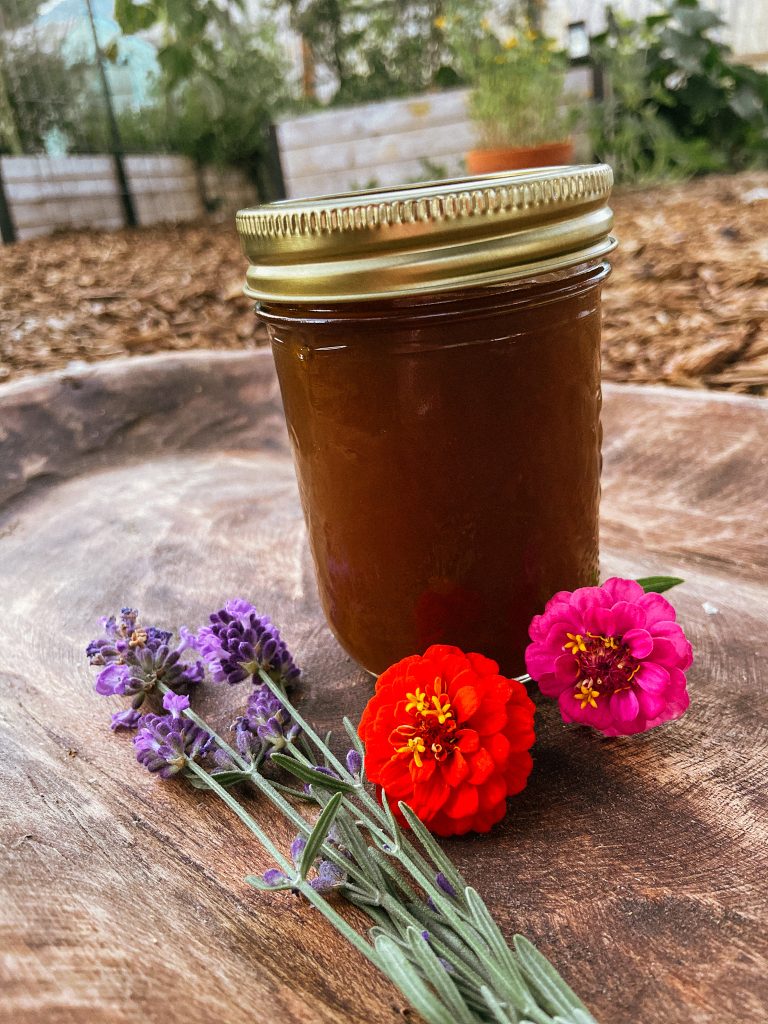
Moistening Herbal Cough Syrup
This cough syrup is for a dry and unproductive cough. This can help to moisten the lungs and expel any trapped mucus.
EQUIPMENT
- 1 stock pot
- 1 mesh strainer
INGREDIENTS
- 2 parts mullein
- 2 parts marshmallow
- 2 parts plantain
- 1 part licorice
- 1/2 part pleurisy optional
- 1/2 part lobelia
- raw honey or another sweetener to taste
INSTRUCTIONS
- Add water and desired amount of herbs to stock pot.
- Bring to a simmer over low heat for approximately 2 hours*. Decrease contents to about half.
- Strain herbs and compost used herbs
- Once syrup has cooled to approximately 100 degrees, add in the raw honey and stir.
- Bottle and refrigerate.
NOTES
To determine the amount of each to add to your recipes each part will be considered a unit of measure. For example, if you make 1-part equal 1/4 cup, then 2 parts in this recipe will equal 1/2 cup and so forth. Or use ounces for better measurement. A part can then be 1/2 oz and for a 2-part herb requirement you would use 1 oz of that herb for this recipe.
You generally use 3oz of herbs per quart of water.
Adding the honey in once the syrup has come to around 100 degrees is to not kill the beneficial properties of raw honey. You can disregard this if not using raw honey and add your sweetener whenever you’d like.
Make sure to research the above herbs before using. Talk with your healthcare provider for any questions or concerns in regard to your personal medical history.
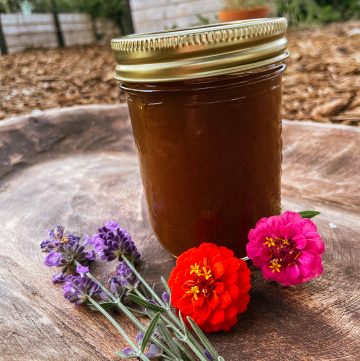
Moistening Herbal Cough Syrup
Equipment
- 1 stock pot
- 1 mesh strainer
Ingredients
- 2 parts mullein
- 2 parts marshmallow
- 2 parts plantain
- 1 part licorice
- 1/2 part pleurisy optional
- 1/2 part lobelia
- raw honey or another sweetener to taste
Instructions
- Add water and desired amount of herbs to stock pot.
- Bring to a simmer over low heat for approximately 2 hours*. Decrease contents to about half.
- Strain herbs and compost used herbs
- Once syrup has cooled to approximately 100 degrees, add in the raw honey and stir.
- Bottle and refrigerate.
Notes
What have you used to help you with bronchitis?
Let me know in the comments what you have used before and if you found it helpful or not.

